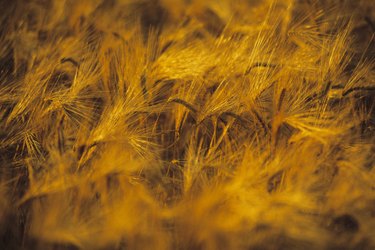Things You’ll Need
-
Towel
-
Measuring cup
-
Barley
-
Food Scale
-
Sheet pan
-
Pot
-
Cheesecloth
-
Strainer
 Making your own malt extract gives you more control over the finished flavor.
Making your own malt extract gives you more control over the finished flavor.
Malt extract is used in beer and breads to create various flavors and as a sugar souce for yeast development. Malt extract can be purchased in dry, powder form, or wet, syrup form. Dry powder form can be kept in dry storage without any special packaging. Pre-made malt extract is typically purchased in cans if it's in syrup form. If you make your own syrup malt extract, it should be used right away or canned to keep it from spoiling. One benefit of making your own malt extract is that you can make it as dark or light as you want during the toasting process.
Step 1
Wet the towel with hot water and ring it out until it is wet, but not dripping.
Step 2
Weigh 1 pound of barley grains with a food scale or purchase the grains in a premeasured 1 pound bag.
Step 3
Spread the grains out in a single layer on a sheet pan and lay the towel over the grains to moisten them and make them warm under the towel. Leave the pan in a warm place, such as a window or the top of an oven, for two days.
Step 4
Check the grains, they should be sprouting. If they are not sprouting re-wet the towel and leave the grains covered. Check them each day until you notice a small sprout from the grains.
Step 5
Remove the towel and place the sheet pan with the grains in the oven at 350 degrees Fahrenheit to allow them to dry. Check the grains after 20 minutes. Remove them when they are a light amber color and smell lightly toasted.
Step 6
Cool the barley on the sheet pan for about 20 minutes, then pour them into a small pot.
Step 7
Measure 1 gallon of water and pour it into the pot with the barley. Cook the barley over medium heat until a thin foam rises to the top and the mixture begins to thicken. This should take about 30 minutes, depending on the amount of barley used.
Step 8
Pour the mixture into the food processor. Process the grains on high for 10 minutes to puree the grains into the thickened liquid. If the mixture becomes pasty, add small amounts of water until the consistency is syrupy.
Step 9
Line a strainer with cheese cloth and pour the processed mixture through the cloth. Discard the solids remaining in the cheesecloth. Reserve the liquid that comes through the cheesecloth, this is your finished malt extract.
Tip
To make a darker and nuttier tasting extract, toast the barley longer in the oven.
To make a dry extract powder for dry storage, eliminate the cooking in water process and process the dry toasted barley in the processor until it becomes a powder.


